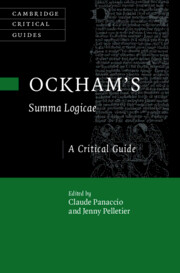Book contents
- Frontmatter
- Contents
- Contributors
- Abbreviations of Ockham’s Works
- Introduction
- Chapter 1 Metaphysical Methodology in Ockham’s Summa Logicae I
- Chapter 2 Ockham and Syncategoremata
- Chapter 3 Ockham on Metalanguage
- Chapter 4 Ockham’s Moderate Modism
- Chapter 5 Relations in Summa Logicae
- Chapter 6 The Threat of Pernicious Ambiguity
- Chapter 7 Ontology and Ockham’s Account of Truth Conditions for Tensed Propositions
- Chapter 8 Ockham’s Theory of the Categorical Syllogism
- Chapter 9 Ockham’s Modal Logic
- Chapter 10 Theory of Demonstration
- Chapter 11 The Obligationes of William of Ockham
- Chapter 12 Ockham on the Liar Paradox
- Chapter 13 Ockham on Figurative Discourse
- Bibliography
- Index
- Cambridge Critical Guides
Chapter 12 - Ockham on the Liar Paradox
Published online by Cambridge University Press: 04 September 2025
- Frontmatter
- Contents
- Contributors
- Abbreviations of Ockham’s Works
- Introduction
- Chapter 1 Metaphysical Methodology in Ockham’s Summa Logicae I
- Chapter 2 Ockham and Syncategoremata
- Chapter 3 Ockham on Metalanguage
- Chapter 4 Ockham’s Moderate Modism
- Chapter 5 Relations in Summa Logicae
- Chapter 6 The Threat of Pernicious Ambiguity
- Chapter 7 Ontology and Ockham’s Account of Truth Conditions for Tensed Propositions
- Chapter 8 Ockham’s Theory of the Categorical Syllogism
- Chapter 9 Ockham’s Modal Logic
- Chapter 10 Theory of Demonstration
- Chapter 11 The Obligationes of William of Ockham
- Chapter 12 Ockham on the Liar Paradox
- Chapter 13 Ockham on Figurative Discourse
- Bibliography
- Index
- Cambridge Critical Guides
Summary
The chapter on insolubles in Ockham’s Summa Logicae is a short appendix inserted toward the end of Part III-3 in chapter 46, alongside a section on obligations, after the treatment of the Topics and before the transition to the material on the Sophistical Refutations. By Ockham’s own admission, the purpose of the section is not to leave “so great a part of logic completely untouched.” Despite the concise character of the exposition, however, Ockham’s analysis of insoluble propositions is notable for his usual clarity of style and purpose, and by the adoption of a standard medieval solution to semantic paradoxes based on a principle of restriction on self-referential expressions containing the predicates ‘true’ or ‘false.’ The present chapter discusses Ockham’s solution and examples in detail, presenting them in the broader context of coeval discussions of semantic paradoxes from the first quarter of the fourteenth century and against the backdrop of Ockham’s own semantic theory.
Information
- Type
- Chapter
- Information
- Ockham’s Summa LogicaeA Critical Guide, pp. 252 - 268Publisher: Cambridge University PressPrint publication year: 2025
